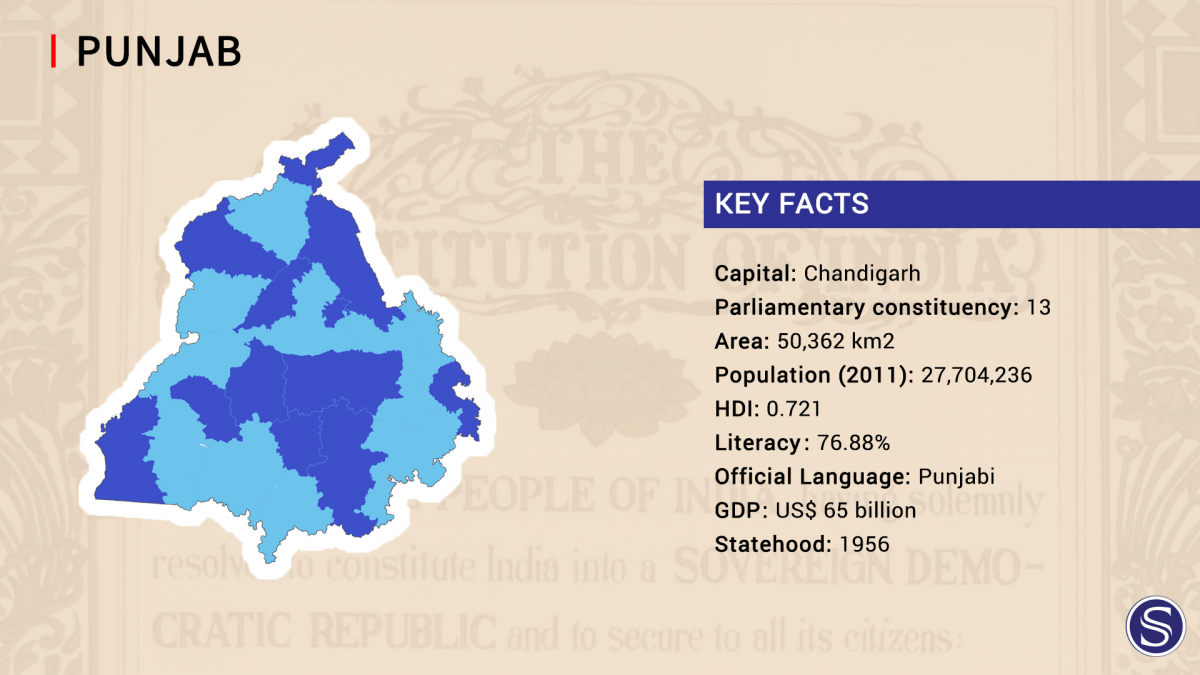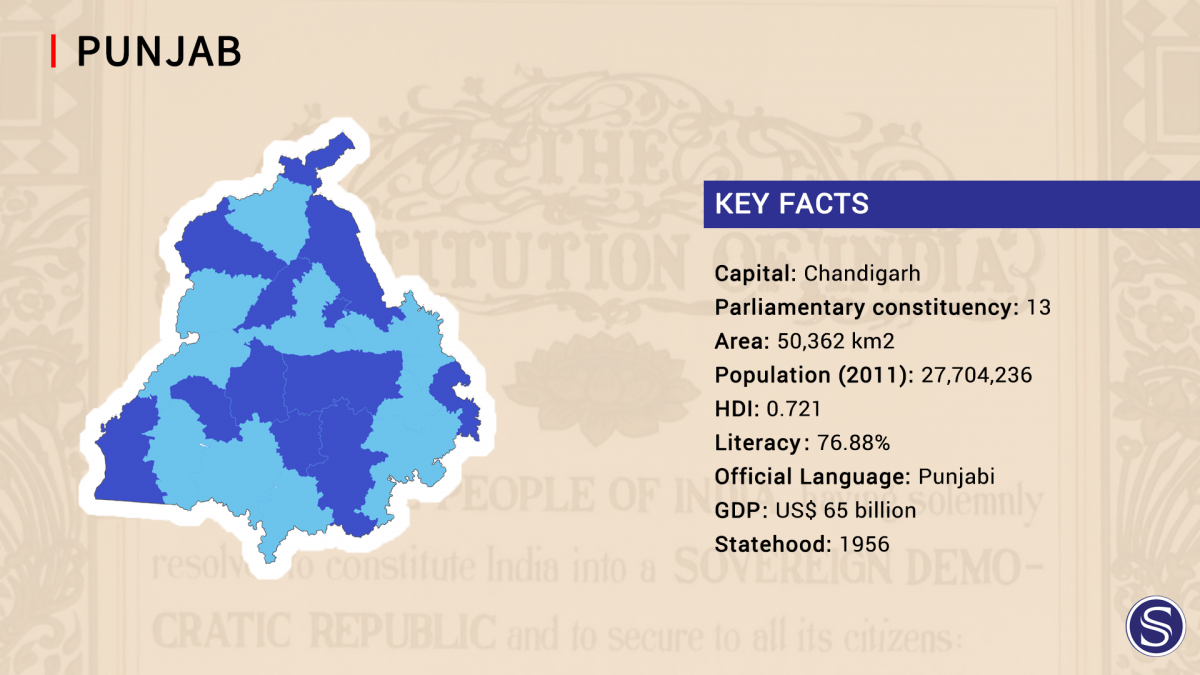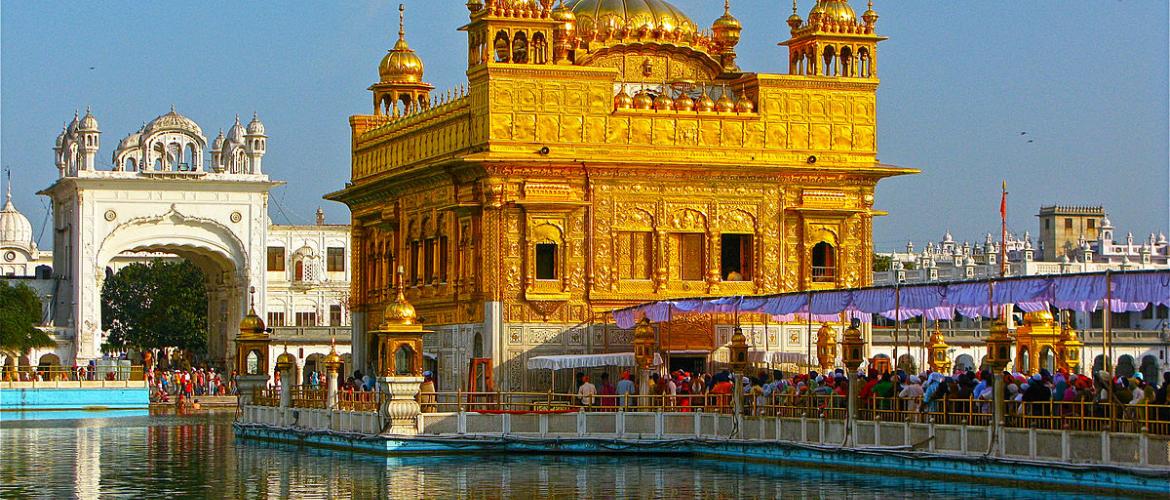Punjab has been the breadbasket for the country by providing with a constant supply of wheat, vegetables and fruits. However, the state has been plagued with issues regarding drug abuse, high fertilizer use and the lack of diversification in the economy. Punjab needs to reform, learn more by reading below.
Background
- The state covers an area of 50,362 square kilometres, 1.53% of India's total geographical area. It is the 20th largest Indian state by area.
- With 27,704,236 inhabitants at the 2011 census, Punjab is the 16th largest state by population.
- The five tributary rivers of the Indus River from which the region took its name are Sutlej, Ravi, Beas, Chenab and Jhelum Rivers; Sutlej, Ravi and Beas are part of the state.
- Punjab is called the "Granary of India" or "India's bread-basket". It produces 10.26% of India's cotton, 19.5% of India's wheat, and 11% of India's rice.
- According to the India State Hunger Index, Punjab has the lowest level of hunger in India.


Analysis
In 1947 the Punjab Province of British India was partitioned along religious lines into West Punjab and East Punjab. Huge numbers of people were displaced, and there was much intercommunal violence. Following independence, several small Punjabi princely states, including Patiala, acceded to the Union of India and were united into the PEPSU. In 1956 this was integrated with the state of East Punjab to create a new, enlarged Indian state called simply "Punjab".
The undivided Punjab, of which Pakistani Punjab forms a major region today, was home to a large minority population of Punjabi Hindus and Sikhs until 1947, apart from the Muslim majority.
Immediately following independence in 1947, and due to the ensuing communal violence and fear, most Sikhs and Punjabi Hindus who found themselves in Pakistan migrated to India.
1) Economy: Punjab is one of the most fertile regions on earth. The region is ideal for growing the wheat crop. Rice, sugar cane, fruits and vegetables are also grown. Punjab has relatively good infrastructure. This includes road, rail, air and river transport links that are extensive throughout the region. Punjab has also one of the lowest poverty rates in India at 6.16% and has won the best state performance award, based on statistical data compiled by the Indian Government. The state has essentially an agrarian economy with a lower industrial output as compared to other states of India. A prominent feature of the industrial scenario of Punjab is its small-sized industrial units. To counter a stagnation in job growth, the state has to diversify its economy to accommodate high-paying, year-long jobs which do not depend on the season.
2) Drug abuse: Punjab suffers a high level of drug abuse amongst its youth, primarily through the use of banned substances smuggled into the state. This is an unchecked menace for the state which could ruin Punjab’s high productivity and render an entire generation dependent on narcotics. The state government’s priority has to be ridding the state of foreign smugglers sending in banned substances across the border.
3) Environment: the fertile land is fed with rivers and rainfall but climate change can drastically impact Punjab’s crop production. In addition, the existing ‘slash-and-burn’ method of agriculture is a major source of air pollution which engulfs most of the already polluted National Capital Region. Punjab also has the highest per capita use of fertilizers per hectare (223 kgs) in the country (average: 90 kgs). Chemical fertilisers have been reported to reduce soil productivity over time, and the government needs to implement a state-wide eco-friendly agricultural program to promote the use of cheaper, more efficient natural fertilisers. In addition, it is expected that natural fertilisers will reduce the debt burden of the farmers, which is also a leading cause of suicides in the state.
Assessment
Our assessment is that the breadbasket of India needs to formulate a strategy to help mitigate the negative impacts of climate change on its crop production cycles. We believe that the state is sufficiently irrigated, and has the technical know-how to implement an overhaul of its crop production process without disturbing the output. We also feel that it has to immediately tackle the problem of widespread drug abuse amongst its youth if it wants to retain a young, robust workforce for the future.

